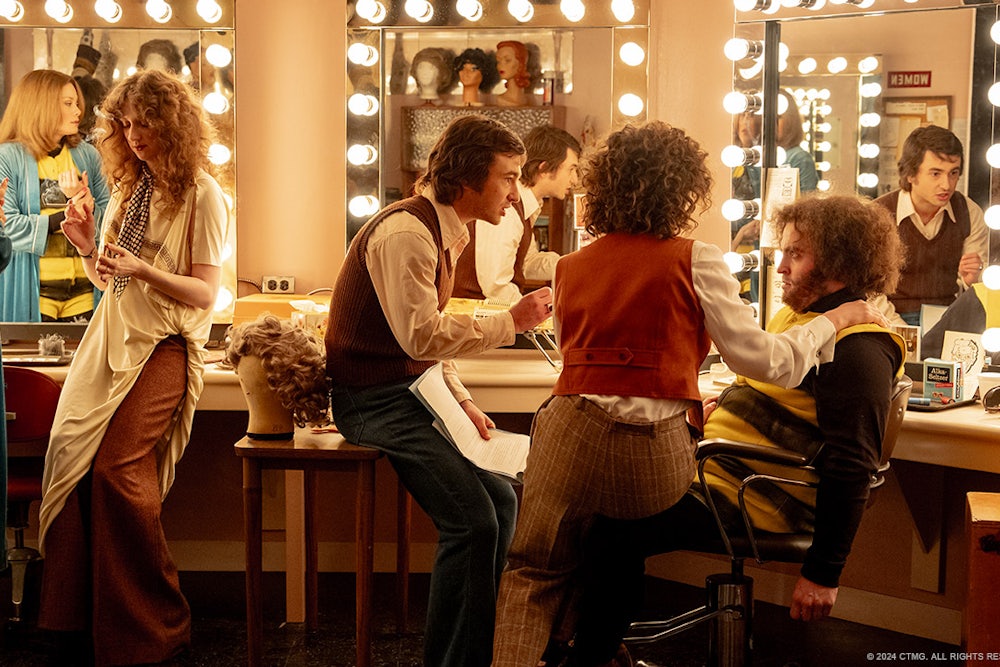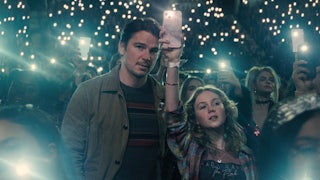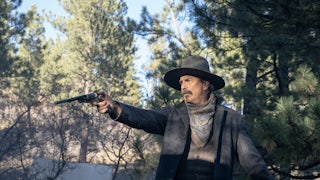“Take me to Rockefeller Center! I’m going to go do Saturday Night Live, a new show on NBC.”
“TV at night? That’ll never work!”
“Fuck you, you fucking dumb cabbie. It’ll be so famous and good at sketch comedy.”
Sadly, the above exchange is not actually from Jason Reitman’s new film, Saturday Night, which dramatizes the circumstances around Saturday Night Live’s fraught and triumphant premiere episode. Rather, it’s from John Mulaney’s recent talk-show appearance alongside fellow former SNL writer Seth Meyers, in which an ostensibly good-natured discussion of Reitman’s film—which is being released to coincide with both awards season and the series’s fiftieth anniversary—mutated into something a little less innocuous. “I worked for five years at Saturday Night Live,” said Mulaney, in the cast-iron deadpan that’s become his trademark. “But I had no idea the kind of pressure cooker that it was. Apparently, it’s high stakes.”
Even if these and other jibes from Mulaney’s conversation with Meyers have plausible deniability as just so much good-natured joshing from professional funny people, they direct attention toward the thin layer of moisture coating Reitman’s slippery act of homage—an admixture that’s one part slickness, one part flop sweat. Such clamminess is admittedly organic to the screenplay, conceived by Reitman and his co-writer Gil Kenan as a kind of real-time thriller, counting down 90 (or so) minutes during the evening of October 11, 1975, when the NBC honchos reportedly hovered over the control-room kill switch until the final moment. The intention of the real-time conceit is to illuminate SNL creator Lorne Michaels’s famous dictum that “the show doesn’t go on because it’s ready; the show goes on because it’s 11:30.”
Such multidirectional chaos is a staple of behind-the-scenes melodramas from 42nd Street to Showgirls, and Saturday Night throws its hat into the ring with a freewheeling panache; cinematographer Eric Steelberg traces graceful figure eights through painstakingly recreated versions of NBC’s downtown Manhattan stronghold, with each and every hallway, dressing room, and loading dock visualized as contested territory in a turf battle between the ruling TV establishment and a merry band of coked-up night owls. The latter group is led by Lorne Michaels, impersonated with poker-faced aplomb by Gabrielle Labelle, already a specialist in the portraiture of moguls as young men after playing Steven Spielberg in The Fabelmans. Here, he’s depicted as a self-styled visionary whose inability to articulate his concept of a sketch-comedy show turned inside out is less a liability than a point of pride. Stepping out of the elevator ferrying him between potential catastrophes, Lorne walks blindly onto a prop cannon showering him in a geyser of crimson goop: It’s a witty bit of slapstick symbolism casting him as infantryman and general in a culture war he doesn’t yet know will turn his way, a righteous naïf stumbling through the corridors of power with his bleeding heart on his sleeve.
In their indispensable SNL oral history, Live From New York, James Andrew Miller and Tom Shales allot an entire chapter to what could be called the metaphysics of Lorne Michaels—specifically, the tricky mix of sophistication, self-effacement, and subtle psychological terrorism that’s allowed him to hold sway over a carousel of cast members for five decades. (“He picked the right profession, because he gets to lord over people who want to kneel at his feet,” snarked Jane Curtin. “He doesn’t acknowledge them, which makes them work harder.”) Michaels, who will turn 80 shortly after SNL’s fiftieth anniversary broadcast, has indicated that he’s not leaving his post anytime soon—a refusal that aligns with the reluctance of Boomer figureheads in all kinds of elevated posts to cede territory to a new generation. The premise of an entrenched, and only semi-benevolent, industry tyrant digging in his heels even as a bunch of gifted kids are nipping at them is potentially the stuff of good cinema; in lieu of anything resembling a long view, however, Saturday Night offers only ring kissing.
Creation myths are by their nature irresistible, and SNL’s debut is even more ready-made for the big-screen treatment than that of Nike, Pop Tarts, or Flamin’ Cheetos, to cite just three examples of the emergent (and singularly pernicious) cinematic subgenre of corporate origin stories. (“Wake me up for the Ambien movie,” tweeted the film critic A.S. Hamrah last year.) The scenario comes fully loaded with a cast of real-life comedy icons, a suite of fetishistic retro signifiers, and a pressurized ratio of suspense to schadenfreude; on some level, you’d have to be a hack to screw it up.
In this imagining of studio 8H, subplots abound. Will the show’s affable but ineffectual network babysitter, Dick Ebersol (Cooper Hoffman), allow himself to get on the right rabble-rousing wavelength or torpedo morale by cluelessly shilling for more product placement? Will Lorne’s wife and behind-the-scenes talent-whisperer, Rosie Shuster (Rachel Sennott), assert herself enough to be given credit for her contributions? Is the mercurial John Belushi (Matt Wood) likely to finally sign his contract before the cameras roll, or before he murders his narcissistic co-star Chevy Chase (Cory Michael Smith)? How does Garrett Morris (Lamorne Morris) feel about being the only African American member of an all-white cast? What about the mutual suspicions of Jane Curtin (Kim Matula), Laraine Newman (Emily Fairn), and Gilda Radner (Ella Hunt) that they’re distaff interlopers in a sexist boys’ club? Was muppeteer Jim Henson (Nicholas Braun) really a clueless, gormless naïf? And did Milton Berle (J.K. Simmons) really have a foot-long member?
Never exactly a formalist by trade, Reitman works diligently to replicate the virtuoso, whirligig schematism of films like Alejandro Gonzalez Inarritu’s Birdman or Damien Chazelle’s Whiplash, borrowing their trademark repertoires of snaky tracking shots and staccato whip pans. In theory, such gold-plated aspirations should be at odds with the underdog storyline, but history is written by the winners, and Reitman—a showbiz kid who once actually made a movie called The Front Runner—isn’t remotely interested in subversion or, heaven knows, critique. Rather, he’s a lapsed satirist whose mode of punching down and sucking up first surfaced in Thank You for Smoking—a meditation on “moral flexibility” (executive produced by Elon Musk and Peter Thiel), which hinted that anybody who falls for the silver-tongued sophistry of Big Tobacco deserves what’s coming to them—and was fully formed in Up in the Air, a heinous post-bailout crowd-pleaser, in which documentary interviews with recently unemployed civilians were used to lubricate a lament for the itinerant, existential loneliness of the executive class.
In spite of its manipulativeness—or maybe because of it—Up in the Air raked in Oscar nominations and momentarily positioned its maker as a potential twenty-first-century heir to Billy Wilder. Fifteen years later, after a middling series of bids for indie and festival-circuit credibility, Reitman has embraced a new role as a caretaker of valuable and inherited intellectual properties. These include Ghostbusters—whose legacy sequels, Afterlife and Frozen Empire, are textbook exercises in profitable nostalgia (and necrophilia, as it used CGI to resurrect deceased cast members)—and, now, Saturday Night Live, which served as an incubator for the comedians populating many of the early-’80s hits of his father, Ivan Reitman. In Make My Day: Movie Culture in the Age of Reagan, J. Hoberman persuasively suggests that Ghostbusters—originally conceived by Dan Aykroyd and John Belushi, and featuring Bill Murray in his signature hipster role—permanently crossed the streams between blockbuster special effects spectacle and hip countercultural cynicism. He doesn’t mean it as a compliment: The trickle-down effect can still be felt in every meretricious piece of franchise dreck leveraging sentimental fan service against smug self-reflexivity.
It’s worth asking, circa 2024, what kind of filmmakers would seek to further enshrine Saturday Night Live in general and its intractable, multimillionaire commander in chief in particular. Last year, in her fair-use parody tour de force, The People’s Joker, director Vera Drew reimagined Michaels as a cheapjack, computer-generated fascist lording over the American comedy establishment; it was a genuinely imaginative engagement with SNL’s institutional power, and a savage update of the affectionate character assassination previously enacted by Mike Myers in the Austin Powers films (Myers reportedly modeled his performance of Dr. Evil on Michaels). If there’s one thing that champions and detractors of Michaels alike can probably agree on at this point, it’s that he can take a joke, but Reitman and Kenan push in the other direction. At one point, their Michaels invokes Che Guevara in his presentation to NBC’s money men. Later the filmmakers literally set their hero next to the sculpture of Prometheus adorning the entrance to Rockefeller Center—a moment that is pretty definitively not played for laughs.
It’s telling that Saturday Night tries to align itself philosophically with the figure of SNL’s original head writer, Michael O’Donoghue (Tommy Dewey), a pop-Voltaire-ian wit who spray-painted the word “danger” on the walls of his office as a kind of artistic ultimatum. One wonders what O’Donoghue—who was hired and fired three times in his 10 years at Saturday Night Live—would make of a movie that’s so afraid of even slightly defacing its subject? The most egregious case is probably when Morris breaks the tension backstage and clears his conscience—by caustically serenading the cast and crew with the immortal refrain “Gonna get me a shotgun and kill all the whiteys I see.” The implication in the cozy, smiling reaction shots is that his colleagues, rather than being suitably chastened, are in on the joke; the irony that a performer who has spoken eloquently—and sometimes exasperatedly—about his tokenization ends up being used to validate the idea that Saturday Night Live was one big happy family. Ditto the way that the show’s female cast members are reduced by the script to mostly levying complaints about their own marginalization—an issue that a more daring movie might have treated as an actual sticking point.
There is a fundamental paradox at the heart of all of this, which is that the more you know about the history of Saturday Night Live, the more equipped you are both to get the script’s myriad in-jokes (one among many: The crew snacks on boxes of the fictional “Colon Blow” cereal) and to recognize the essential falseness of the storytelling—the way the movie takes every possible opportunity to flatter its subjects, its audience, and itself. At the same time, you don’t have to be a comedy scholar to roll your eyes at the relentlessly on-nose dialogue (“They want you to fail,” blurts Ebersol at a moment of truth), or the running joke where a stagehand is forced to literally rebuild a collapsed bit of set decoration brick by brick. The final scene inevitably features O’Donoghue and Belushi doing their great, bewildering bit about a haughty speech therapist and his sweetly deferential client, which ends with both men feigning heart attacks—a non sequitur that was designed to shake the audience of the day out of its complacent expectations and let them know that anything was possible.
It’s fun to imagine a version of Saturday Night made in that same anarchic spirit—maybe even one with the guts to revise reality à la Quentin Tarantino’s counterfactual period pieces and imagine an unhappy ending in which the show doesn’t go on after all, in which Lorne Michaels and company get their fingertips fed to the wolverines, or get stung to death by killer bees or eaten by the Landshark. Instead, what we see is what we get: a palatable tribute to antiestablishment attitudes made in the shadow of television’s longest-standing monolith; a hymn to the exhilaration of risk taking that plays things completely safe. In the absence of anything remotely resembling ambivalence about the complex and contentious legacy of Saturday Night Live, all of those roving, loop-de-loop camera movements become an emblem for what’s ultimately nothing more than a victory lap over hallowed ground—or, O’Donoghue might have termed it, a cinematic circle jerk.






